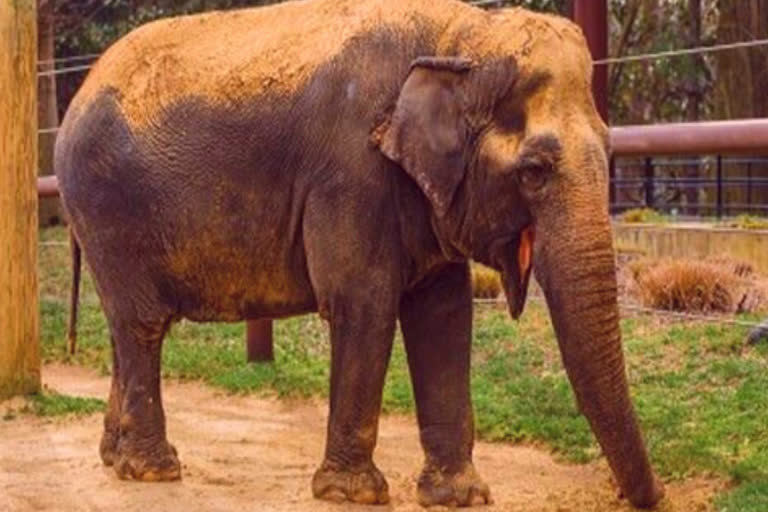Washington: The Smithsonian's National Zoo community is mourning the loss of Ambika, the beloved eldest member of its Asian elephant herd. The 72-year-old was humanely euthanized on Friday following a recent and irreversible decline in her health.
Born in India around 1948, Ambika was the third oldest Asian elephant in the North American population. At 8, the female elephant was captured in the Coorg forest where she worked as a logging elephant until 1961. Ambika was then given to the Zoo as a gift from the children of India.
"RIP Ambika - a loving gift from India. Elderly Asian Elephant Ambika Dies at Smithsonian's National Zoo," tweeted Indian Ambassador to US Taranjit Singh Sandhu.
-
RIP Ambika - a loving gift from India. Elderly Asian Elephant Ambika Dies at Smithsonian’s National Zoo | Smithsonian's National Zoo https://t.co/ISkmDRrgy9
— Taranjit Singh Sandhu (@SandhuTaranjitS) March 28, 2020 " class="align-text-top noRightClick twitterSection" data="
">RIP Ambika - a loving gift from India. Elderly Asian Elephant Ambika Dies at Smithsonian’s National Zoo | Smithsonian's National Zoo https://t.co/ISkmDRrgy9
— Taranjit Singh Sandhu (@SandhuTaranjitS) March 28, 2020RIP Ambika - a loving gift from India. Elderly Asian Elephant Ambika Dies at Smithsonian’s National Zoo | Smithsonian's National Zoo https://t.co/ISkmDRrgy9
— Taranjit Singh Sandhu (@SandhuTaranjitS) March 28, 2020
Last week, keepers noticed that Ambika's right-front leg which bore the brunt of her weight developed a curve that weakened her ability to stand. Though she had some good days and some bad days, the staff grew concerned when she chose not to explore her habitat as much as she normally would or engage with her keepers or elephant companions, Shanthi and Bozie.
In discussing Ambika's overall quality of life, the elephant and veterinary team strongly considered Ambika's gait, blood-work parameters, radiographs, progressions of her lesions and her tendency to occasionally isolate from Shanthi and Bozie.
Given her extremely old age, decline, physically and socially and poor long-term prognosis, they felt they had exhausted all treatment options and made the decision to humanely euthanize her.
Read Also: In a first, Illinois infant with COVID-19 passes away
Ambika's euthanasia took place in the Elephant Barn. Shanthi and Bozie were not present for the procedure but were allowed to spend some time with their deceased herd mate given their close bond with her.
Many scientists believe that the process of exploring the body of the deceased elephant is a recognition of death and is likely part of a grieving process. Elephants will commonly touch the temporal glands, ear canal, mouth and trunk tip.
Often, they will make a rumble vocalization while inspecting the body. For approximately 15 to 20 minutes, Shanthi and Bozie walked around Ambika. They sniffed and touched her with their trunks. Although the pair usually communicate with squeaks, honks and trumpets, they were fairly quiet during this encounter.
Elephant keepers have fondly reflected on Ambika's sense of humour, particularly during mealtimes, when the persnickety eater would arrange her grains to her liking before eating.
Read Also: Princess Maria Teresa of Spain becomes first royal to die from COVID-19
Ambika was one of the most researched elephants in the world. As part of the Zoo's enrichment and training program, elephant keepers trained Ambika to voluntarily participate in daily husbandry care and medical procedures.
Not only did this allow animal care staff to routinely monitor her health, but it also allowed her to help Zoo scientists better understand the behaviour, biology, reproduction and ecology of Asian elephants. Ambika routinely allowed staff to collect blood samples for the Smithsonian Conservation Biology Institute's endocrine lab to study cortisol levels, participated in studies that assessed elephant vocalizations and enrichment preferences and enabled veterinarians to take carpal and toe radiographs to study the onset and progression of osteoarthritis.
Most notably, Ambika was the first elephant to receive the gonadotropin-releasing hormone (GnRH) vaccine to prevent leiomyomas--fibroids in the uterus--which are a known cause of mortality in Asian elephants in human care. Female Asian elephants in human care typically live into their mid-40s; there is not enough consistent data available on wild Asian elephants to accurately estimate their lifespan.
For the past 59 years, Ambika has been integral to the Zoo's campaign to save Asian elephants from extinction and a favourite among generations of Zoo visitors.
(With inputs from ANI)



